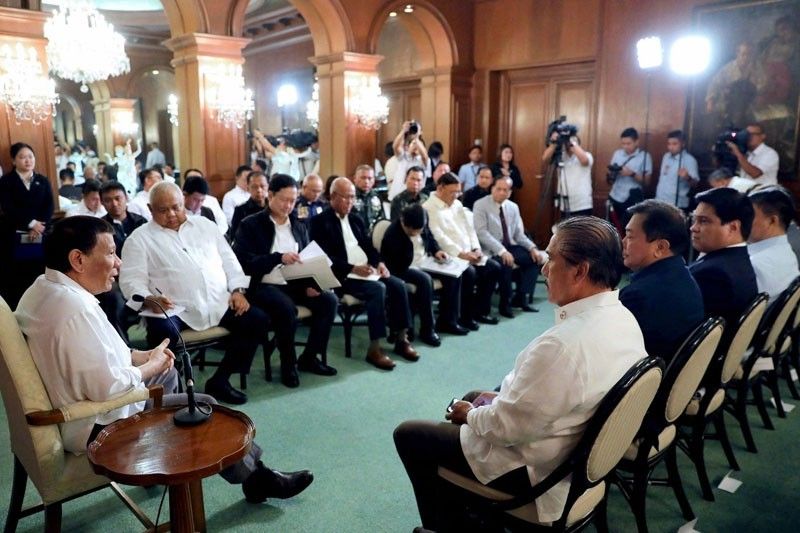Cabinet unanimously rejects zero tariff plan

MANILA, Philippines — Cabinet officials are unanimously against the proposal to reduce to zero the tariff on some agriculture products as part of measures to control inflation, citing the scheme’s adverse effect on local producers, Malacañang said yesterday.
Presidential spokesman Harry Roque told reporters that no Cabinet member had voiced support for the zero tariff proposal which, if implemented, would likely flood the market with imported goods.
Albay Rep. Joey Salceda on Wednesday announced that President Duterte would issue an executive order imposing zero tariff on imported fish, corn and vegetables and feed wheat to rein in inflation.
Salceda said the EO would be released at the end of Congress’ 11-day break beginning next weekend.
The zero-tariff tack was supposedly one of the counter-inflation measures proposed by Speaker Gloria Macapagal-Arroyo and other House leaders at a meeting with President Duterte’s economic team last week.
“I do not know the source of Congressman Salceda’s information. But what I know is there are discussions and there are different opinions. (Agriculture) Secretary (Emmanuel) Piñol says it’s going to be war with domestic agricultural producers. And nobody is advocating zero in the Cabinet right now,” Roque said at a press briefing.
“I verified from the economic team, they listened to the suggestion of former president and Speaker GMA. But no one actually agreed that it should be done. So there’s a possibility of reducing tariffs, but no one in the Cabinet has told me that they will actually endorse zero tariffs,” he added.
Roque cited the need to balance the need to lower inflation and to protect local producers.
“I think (Trade) Secretary (Ramon) Lopez had a balanced view. Tariffs may be lowered but they cannot be removed,” the spokesman said.
“What I know is no one is saying that there will be zero tariff. But the lowering of tariff is possible,” he added.
At a Senate hearing on Wednesday, Socioeconomic Planning Secretary Ernesto Pernia also talked about a planned EO – but only on reducing tariff and not removing it outright.
Inflation, or the rate at which the prices of goods and services is rising, hit 5.7 percent in July, higher than 5.2 percent in June and the fastest in over five years – largely because of higher food and transport costs.
Senators called on Malacañang to tread carefully on its plan to issue an EO on tariff cut.
“It will reduce prices definitely but at what cost to our local producers? Once the market is flooded with imported meat, fish and vegetables, prices will go down for sure following the law of supply and demand,” Sen. Panfilo Lacson said.
“However, our local producers – the farmers, hog and fowl raisers – will also suffer since they may not be able to compete, considering their high cost of production,” he added.
Senate President Vicente Sotto III said he wants to see a matrix on the effect of tariff cut on local producers before an EO on the matter is issued.
Sen. Joseph Victor Ejercito said the economic managers should study carefully the impact of zero or lower tariff on local rice farmers.
“We need to be careful that it doesn’t cause more hardship to those in the agricultural sector,” he said.
“Development is not a zero-sum game where one sector wins at the expense of another group,” Ejercito said.
Sen. Francis Pangilinan called on the government to provide greater support for the rice farmers so that they could produce more.
He suggested that the tariff collected from imported rice be earmarked for support services for the farmers.
Shorter list
In a television interview yesterday, however, Salceda revealed a shorter list of products that could be imported at cheaper price.
Salceda said fish was delisted following the removal of meat on Wednesday reportedly due to “strong lobby” from meat industry leaders. He did not elaborate.
“So we are now left with the ingredients – corn and wheat flour – and rice,” he said.
Salceda reiterated the proposal of House leaders for executive agencies to defer any “regulated price adjustments” for electricity, water and oil products until inflation falls.
He said the high cost of power and fuel is the top inflation driver, contributing .9 percent to the 5.7-percent inflation in July as reported by the Philippine Statistics Authority (PSA).
He said fish accounted for the second largest contribution at .7 percent among 10 products and services the PSA monitored.
Rice contributed .5 percent, and fish and meat .4 percent each, he said.
Rep. Michael Romero of 1-Pacman, an economist like Arroyo and Salceda, has said the anti-inflation measures proposed by the Speaker could cut inflation by 1.8 percent to less than five percent.
Salceda indicated that the pressure to narrow the proposed zero tariff list comes from members of the Cabinet.
“We can understand the position of Agriculture Secretary Manny Piñol, who has to protect his constituency,” he said. He said the House could not insist on its recommended counter-inflation measures.
He recalled that in 2008, when Arroyo was president, “we took strong measures, including imposing price control on oil products, to arrest inflation.”
“We were in the executive (branch) then. But now, we are in the legislature, so we could only suggest,” Salceda, who was then Arroyo’s economic adviser, said.
A congressman, who is part of the Speaker’s economic team, told The STAR that their proposal to reduce tariff on meat and fish to zero was meant to bring down the price not only of fresh meat and fish but of canned products as well.
“In particular, we were targeting canned sardines, which the poor buy,” he said.
Alarming
Some lawmakers, meanwhile, find the proposal to import more rice alarming. They said any shortage could be artificial and just a result of maneuvering by a cartel.
“Rice self-sufficiency is the anchor of the national food security policy. It is perfectly achievable with adequate support from government and a public-private backed credit program,” Butil party-list Rep. Cecilia Leonila Chavez said.
“To abandon the pursuit of self-sufficiency is suicidal, ill-advised and the equivalent of betraying our rice farmers,” she said.
“I have this fear that there is rejoicing in the rice production centers of Thailand and Vietnam after hearing the policy declaration from the Department of Agriculture, with support and prodding from the economic managers,” Chavez said.
Chavez, who belongs to the super majority coalition in the House, said that importing more rice would be a “slap on the nationalist programs” of President Duterte.
House Minority Leader Danilo Suarez expressed the same concerns. The Quezon congressman is opposed to the rice tariffication bill, which the House passed on second reading Tuesday.
He noted that only foreign farmers from rice exporting countries like Vietnam, Thailand, Cambodia and Laos stand to benefit from such measure.
“We’re just making their farmers rich. Let’s take care of our farmers first,” he said in Filipino.
Grains industry players said the National Food Authority (NFA) should not immediately release the additional rice imports to the market.
“As long as it is not released in the market to protect the farmers. We are expecting a bountiful harvest because it is rainy season so those not covered by irrigation, they will be able to harvest,” Philippine Confederation of Grains Association (PCGA) president Joji Co said.
“The only time to release is by early January which is also considered lean month. If, weather permitting, we can have a good harvest, the price and supply will surely stabilize and the planned import can be our buffer stock,” he added.
PCGA said it has no problem with the proposal to import 500,000 metric tons (MT) of rice as part of measures to control inflation.
‘Timing is important’
But Co emphasized the government should have thought of importing as early as the first quarter to avoid the depletion of NFA stocks.
“Timing is very important. Their statement before is that they should not import rice because it’s the summer harvest season. That is wrong because even if you import, it will only affect the price of palay if you are going to sell it in the market,” Co said.
“At that time, prices are down in the world market and it would have been good to import. When it arrives, just store it in the NFA warehouses and don’t sell it to the market so as not to affect local palay,” he added.
This, however, did not happen as the NFA began the importation at the start of the lean months, causing delays in delivery and prompting the immediate release of rice imports to the market.
As more importation looms, the Department of Finance (DOF) has ordered the Bureau of Customs (BOC) to be on alert for possible smuggling of rice and sugar.
At a DOF executive committee meeting, Finance Secretary Carlos Dominguez III also told the BOC led by Commissioner Isidro Lapeña to speed up the auction of seized smuggled rice stocks.
Junk TRAIN
Meanwhile, the militant Bagong Alyansang Makabayan (Bayan) said the record 5.7 percent inflation rate should make lawmakers work to junk the TRAIN law.
“The tariff reduction’s effect on high prices may not even be immediately felt, whereas scrapping or suspending TRAIN will have an immediate effect on prices,” Bayan secretary-general Renato Reyes said.
“It makes more sense to support local production and increase domestic supply as a way to stabilize prices, rather than give another advantage to importers,” he said.
“Zero-tariff importation is not the solution to a problem, obviously created by the Duterte-instigated inflation via his TRAIN law, when monopoly traders dominate our economy, the proposal will only guarantee their giant, super-profits, while poor sectors are suffering from high prices and losses in livelihood,” said Zenaida Soriano, chair of the National Federation of Peasant Women. – With Jess Diaz, Marvin Sy, Delon Porcalla, Rhodina Villanueva, Louise Maureen Simeon, Mary Grace Padin
- Latest
- Trending



























